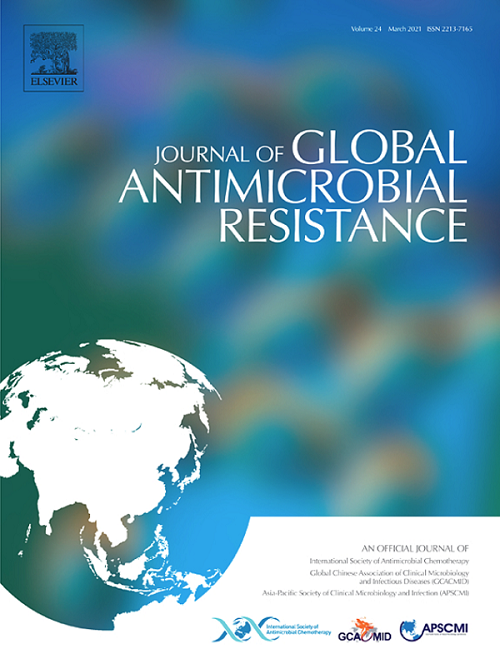Wastewater-based AMR surveillance associated with tourism on a Caribbean island (Guadeloupe)
IF 3.7
3区 医学
Q2 INFECTIOUS DISEASES
引用次数: 0
Abstract
Objectives
Antimicrobial resistance (AMR) is a major public health concern worldwide. International travel is a risk factor for acquiring antibiotic-resistant bacteria (ARB) and antibiotic-resistance genes (ARGs). Therefore, understanding the transmission of ARB and ARGs is instrumental in tackling AMR. This longitudinal study aimed to assess the benefit of wastewater monitoring in Guadeloupe to evaluate the role of tourism in the spread of AMR.
Methods
A wastewater-based surveillance (WBS) study was conducted to monitor AMR in Guadeloupe in 2022 during dry and wet seasons. We characterized the resistome, microbiome and exposome of water samples collected in wastewater treatment facilities of two cities with different levels of tourism activities, in the content of aircraft toilets, and the pumping station receiving effluents from hotels.
Results
The results show that the WBS approach facilitates the differentiation of various untreated effluents concerning exposome, microbiome, and resistome, offering insights into AMR dissemination. Additionally, the findings reveal that microbiome and exposome are comparable across sites and seasons, while resistome characterisation at specific locations may be pertinent for health surveillance. The microbiome of aircraft was predominantly composed of anaerobic bacteria from human intestinal microbiota, whereas the other locations exhibited a blend of human and environmental bacteria. Notably, individuals arriving by air have not introduced clinically significant resistance genes. Exposome compounds have been shown to influence the resistome's variance.
Conclusions
Clear differences were seen between the aircraft and the local sampling sites, indicating that the contribution of tourism to the observed resistance in Guadeloupe is not significant.

加勒比海岛屿(瓜德罗普岛)与旅游业相关的废水抗菌素耐药性监测。
背景:抗菌素耐药性(AMR)是世界范围内的一个主要公共卫生问题。国际旅行是获得抗生素耐药细菌和抗生素耐药基因的危险因素。因此,了解ARB和ARGs的传播有助于解决抗菌素耐药性问题。本纵向研究旨在评估瓜德罗普岛废水监测的效益,以评估旅游业在抗菌素耐药性传播中的作用。方法:采用污水基监测(WBS)方法对瓜德罗普岛2022年旱季和雨季AMR进行监测。我们对两个城市不同旅游活动水平的污水处理设施、飞机厕所和酒店污水泵站内的水样进行了抗性组、微生物组和暴露特征分析。结果:结果表明,WBS方法促进了各种未经处理的污水在暴露体、微生物组和抵抗组方面的分化,为AMR的传播提供了见解。此外,研究结果表明,微生物组和暴露体在不同地点和季节具有可比性,而特定地点的抗性组特征可能与健康监测有关。飞机的微生物群主要由来自人类肠道微生物群的厌氧菌组成,而其他地点则表现出人类和环境细菌的混合。值得注意的是,乘飞机抵达的人没有引入临床上显著的耐药基因。暴露化合物已被证明能影响抵抗组的变异。结论:飞机和当地采样点之间存在明显差异,表明旅游对瓜德罗普岛观察到的抗性贡献不显著。
本文章由计算机程序翻译,如有差异,请以英文原文为准。
求助全文
约1分钟内获得全文
求助全文
来源期刊

Journal of global antimicrobial resistance
INFECTIOUS DISEASES-PHARMACOLOGY & PHARMACY
CiteScore
8.70
自引率
2.20%
发文量
285
审稿时长
34 weeks
期刊介绍:
The Journal of Global Antimicrobial Resistance (JGAR) is a quarterly online journal run by an international Editorial Board that focuses on the global spread of antibiotic-resistant microbes.
JGAR is a dedicated journal for all professionals working in research, health care, the environment and animal infection control, aiming to track the resistance threat worldwide and provides a single voice devoted to antimicrobial resistance (AMR).
Featuring peer-reviewed and up to date research articles, reviews, short notes and hot topics JGAR covers the key topics related to antibacterial, antiviral, antifungal and antiparasitic resistance.
 求助内容:
求助内容: 应助结果提醒方式:
应助结果提醒方式:


